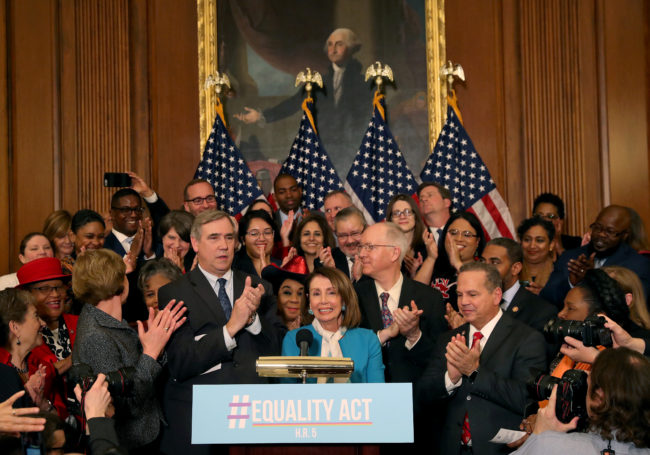President Donald Trump ‘opposes the Equality Act’

President Donald Trump does not support the Equality Act, an unnamed White House official told the Washington Blade.
The report, published on Monday (May 13), suggests even more hurdles along the way for the legislation that would extend the Civil Rights Act of 1964 to include gender identity and sexual orientation as categories protected from discrimination at the federal level.
The bill, which was introduced in March and is scheduled for a vote on the House floor on Friday (May 17), would ensure LGBT+ people can’t be discriminated against in areas including public accommodations and facilities, education, federal funding, employment, housing, credit, and the jury system.

House and Senate Democrats introduced the Equality Act of 2019 which would ban discrimination against lesbian, gay, bisexual and transgender people, on March 13, 2019 in Washington, DC. (Mark Wilson/Getty Images)
The bill’s definition of public accommodations includes “exhibitions, recreation, exercise, amusement, gatherings, displays, goods, services, programs, and transportation services.” It also explicitly prohibits denying an individual access to “a shared facility, including a restroom, a locker room, and a dressing room, that is in accordance with the individual’s gender identity.”
The senior administration official told the Washington Blade in a statement via email: “The Trump administration absolutely opposes discrimination of any kind and supports the equal treatment of all; however, this bill in its current form is filled with poison pills that threaten to undermine parental and conscience rights.”
Why do conservatives oppose the Equality Act?
The statement comes days after nearly 100 conservative activists urged conservative lawmakers to oppose the Equality Act in a letter dated May 10.
Conservatives are opposed to the Equality Act because they fear it will undermine religious freedoms, as individuals or organisations will no longer be able to turn away or fire LGBT+ people, regardless of their beliefs.
The 93 letter signatories include former members of the Reagan administration as well as representatives of organisations such as the Family Research Council, the Alliance Defending Freedom, the Liberty Counsel and the American Family Association—all four of these were labeled hate groups by the monitoring organisation Southern Poverty Law Center due to their anti-LGBT ideology.
“The LGBTQ community, and all Americans for that matter, deserve a president with the courage and decency to sign this bill into law.”
— Chad Griffin
The Church of Jesus Christ of Latter-day Saints also expressed its opposition to the Equality Act in an official statement published on Monday.
“By opposing this common sense civil rights legislation, Donald Trump is ensuring that LGBTQ people remain at risk of being fired or denied housing in a majority of states,” said Chad Griffin, president of the LGBT+ rights group Human Rights Campaign, reacting to the Washington Blade report in a statement.
He added: “The LGBTQ community, and all Americans for that matter, deserve a president with the courage and decency to sign this bill into law, and we will continue the urgent work to pass the Equality Act and replace Donald Trump with a pro-equality president who will sign it into law.”
Currently, only three Republicans in the House of Representatives feature among the 240 co-sponsors of the bill—Pennsylvania’s Brian K. Fitzpatrick, New York’s John Katko and Puerto Rico’s Jenniffer Gonzalez-Colon.
Illinois Congressman Dan Lipinski, the only House Democrat who does not support the Equality Act, recently faced calls from the LGBT+ media monitoring group GLAAD to support the legislation.
The bill is expected to pass in the House, where Democrats hold a majority, but will face a tougher battle in the Republican-controlled Senate. Should the bill pass both votes, President Trump may still refuse to sign it.

